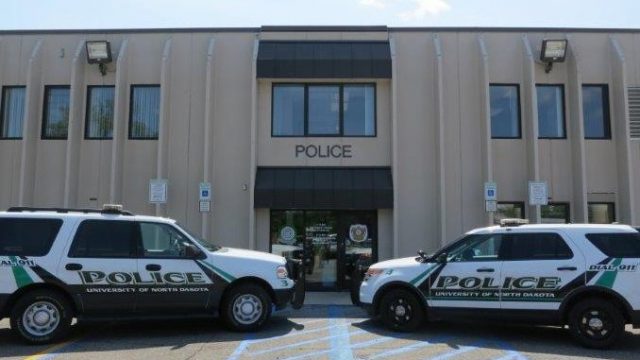Campus Cops Misled Lawmakers On Cases Dismissed Over Jurisdictional Issues

In a ruling last year the North Dakota Supreme Court found that campus police departments had been breaking the law by patrolling off-campus.
Now law enforcement is taking the issue to the Legislature, demanding that lawmakers overturn the Supreme Court and give campus cops permission to patrol off campus. To make the case, University of North Dakota Campus Police Chief Eric Plummer told lawmakers that DUI offenders and underage drinkers are going free because of the Supreme Court’s decision.
“Prior to the decision, we regularly patrolled the areas in and around campus and kept many DUI, property crime, and drugs offenders off of our campus property,” Plummer told a recent meeting of the interim Higher Education Committee via letter. “The limits posed by the Kroschel decision have restricted our officers to the point that DUI offenders are not being prosecuted once caught because of jurisdictional concerns. I fear that this is creating an atmosphere where a tragic situation is just around the corner.”
Plummer, though, is being more than a little misleading. I put in an open records request for information (ZIP file) pertaining to the cases Plummer referred to, and what I found is evidence that drunk drivers and other offenders are going unprosecuted because the cops are breaking the law by exceeding their jurisdictional boundaries.
Below is a PDF of a memorandum opinion in the State of North Dakota vs. Creamer pertaining to a DUI arrest near, but not on, the University of North Dakota campus (approximate location). The arrest happened in November of last year, months after the Supreme Court ruled that campus cops couldn’t patrol off campus.
In the opinion, District Judge Debbie Kleven found that the arresting UND police officer did not follow the Supreme Court’s guidance in addressing an off-campus infraction:
Chief Plummer says the Supreme Court ruling is restricting them to the point where people who break the law are not being held accountable. In reality, per this opinion in State vs. Creamer, the problem is that campus cops aren’t following the law even months after the state Supreme Court laid it down.
As the above excerpt shows the courts have given campus cops the means by which they can address off-campus crimes they come across – the arresting officer in the Creamer case could have made a citizens arrest and called in the Grand Forks PD and been in the clear – but instead the campus cops seem to want a blank check from the Legislature to patrol off campus.
That’s unfortunate. If anything we should be going to the opposite direction, away from redundant and expensive campus police forces to campus security backed by already-existing municipal/county law enforcement.
By the way, the court in the Creamer case also refused to accept a memorandum (PDF) sent out by the Attorney General’s office telling campus cops that they could still patrol and arrest near campuses, meaning the AG’s office has been giving the campus cops some bad legal advice. At least in the eyes of the courts.
In all the UND police department provided me with 13 cases (see all the cover letters below) which were dismissed, they argue, because of the court’s standing on jurisdiction. I ran them by Fargo attorney Mark Friese of the Vogel Law Firm – an outspoken critic of campus police jurisdiction – and he said the real problem is that campus cops can’t seem to accept the court rulings on their jurisdiction.
“The information provided to you (including the State’s Attorney’s direction) shows this is pretty simple: quit making stops and arrests off campus—if there is a pressing issue, alert local police,” Friese told me in an email response to the records I obtained. “They’re trying to recast the issue as drunk drivers or adults under 21 with alcohol being set free, rather than casting it in the proper light: campus police continue to refuse to follow the law.”





